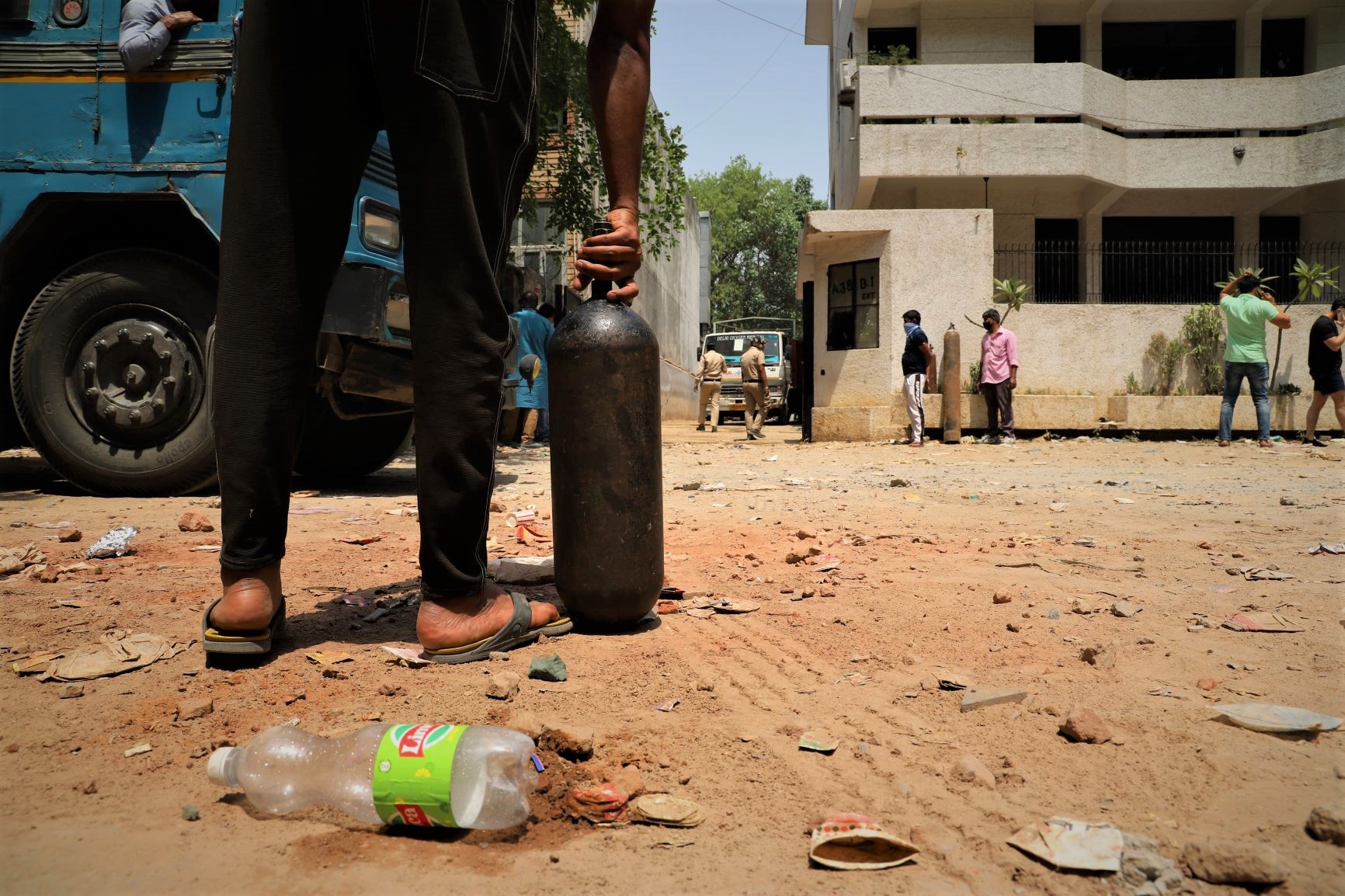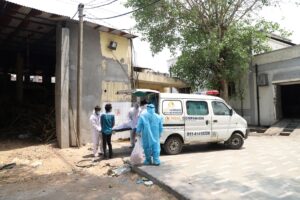Thriving Covid-19 black market as desperate families pay heavy price

An unprecedented shortage of medical oxygen emerged in mid-March in Delhi (MIG Photos/Aman Kanojiya)
Recently, a professor of the Jamia Milia Islamia University in New Delhi, who had a severe case of Covid-19 infection, was battling for life at Life Line Hospital in Laxmi Nagar in east Delhi. The doctors said that he urgently needed oxygen in order to pull through.
As the professor lived alone in Delhi, a group of his students got together to get hold of a cylinder. However, the task proved to be a monumental one for the students. “In the hospital, they said their oxygen supply was getting over. They were continuously saying that we will have to get our own oxygen cylinder as they provided oxygen cylinder for three days, but since it was getting over they were telling all families to arrange for their own cylinders. Our professor had been admitted for 10 days. So we bought the cylinder,” says Sakeer Hussain, a student of law at Jamia Milia, one of the students involved. He says that they tried every listed number of medical oxygen suppliers, but could not get any response. After three days of incessant calls, as the professor’s health deteriorated, they managed to get hold of a tiny 7-liter cylinder. “I think I called more than 50 numbers. But nobody was taking the calls,” he says.
Finally, it was on one of the WhatsApp groups for Covid-19 care that they found the number of a person who could give them the vital gas. Only, it was being sold in the black market and about several times over the regular price. “The contact was given in the social media and there it was mentioned INR 26,000 for buying a 7-liter cylinder. We bought it at the same price. The payment was done by cash as the sellers accepted only cash,” Hussain tells Media India Group. Hussain adds that later on, even a refill cost INR 10,000, while normally a 45-litre refill costs INR 3000.
Despite being students and the amount being very high, Hussain says that he and his friends were ready to pay any amount just to get the cylinder for his professor. “At that particular moment, it cannot be about the money. It is a matter of life or death. So anybody will pay four times the amount,” he says.
Sakeer said the cylinder was not delivered to his house but the sellers told them to meet by a roadside in Okhla where they would wait in a vehicle. “It was in Okhla near Jamia. They didn’t tell us about their offices and we didn’t push it also as we were not in that condition,” he says.
Profiteering as widespread as pandemic
Unfortunately, the experience that Hussain and his friends had was hardly an exception in the second wave of the coronavirus pandemic that seems to have gripped the entire country in a vicious clutch. The second wave has not only witnessed Covid-19 as people’s enemy but also thousands of black marketers, cutting across the social spectrum, who make money on people’s misery and suffering.
Since an unprecedented shortage of medical oxygen emerged in mid-March, the demand for oxygen cylinders reached an all-time high and several reports of black marketing of oxygen cylinders, oxygen concentrators, flowmeters, as well as of Remdesivir, a life-saving drug for a Covid-19 patient, began to emerge from all over the country, but especially in Delhi and neighbouring areas where the second wave hit in the most vicious manner in March itself.
In the last three weeks, Delhi Police alone has busted at least 75 cases and arrested more than 90 people who were either hoarding these items or selling them at exorbitant rates. Around 105 oxygen concentrators were seized from Khan Chacha and Townhall, two of the most renowned restaurants in New Delhi’s super-chic Khan Market.
Both the restaurants are owned by Delhi’s high-profile businessman and celebrity, Navneet Kalra, who has been absconding since the raid. A few days later, the police seized 419 oxygen concentrators from Nege Ju restaurant in Lodhi colony, also owned by Kalra, and a warehouse in Chattarpur Farms. Four men, including the restaurant manager, were arrested at the time for allegedly black-marketing the equipment. Kalra remains missing till now.
After the seizures, Delhi Police Commissioner S N Shrivastava directed all the senior officials to crackdown on the rampant black-marketing and immediately lodge FIRs for fraud in such cases.
It is not just oxygen that has suddenly become rare. Sakeer says they also had to pay a high price for Remdesivir. “We looked everywhere for Remdesivir medicine. But we didn’t get the medicine. When we went to some medical shops they said they are not getting the distribution so you can contact the distributors directly. When we called the distributors, nobody picked the call. So we went to the distributors’ offices, but to no avail. We did find one at Lucky Medical Store in Okhla Phase 2. When we went there they said they could not give the medicine in retail but could sell only to pharmacists. Finally, we went to a medical shop after 2-3 days and there we got one dose of Remdesivir for INR 30,000,” Hussain says.
As the professor needed a total of five doses, the students decided to check prices elsewhere, especially in their home town in Kerala, where it was widely available and only for INR 2000. “So, instead of paying INR 150,000 for the five, one of us took a flight to Kerala, bought the five doses and came back. All of this cost us much less than the price we had paid for one injection,” he says.

Several families in Delhi have faced problems while arranging for a hearse to carry the body to a crematorium (MIG photos/Aman Kanojiya)
Cashing in on corpses
It is not just on the living that the black marketers are making money, they seem to be not sparing even those who have died. Ever since the second wave took hold of the national capital, ambulances and hearses seem to have disappeared as a result, relatives of patients have been forced to pay through their nose not just for getting the patients to hospitals, but even for moving bodies of those who succumb to the virus to the crematoriums for giving them a dignified farewell.
Savita Chawla, a resident of Kalyan Vihar in north Delhi, recently lost her mother-in-law due to Covid-19. Chawla says that even though her oxygen level was alright she died due to a heart attack. However, the real challenge for the family was to arrange for a hearse. She says that after a lot of calls and pleadings they could only find one hearse with the help of a relative in Mumbai who gave them a number of a service provider in Delhi.
“After making several calls we got this number of a hearse person who charged us INR 30,000 for a distance of less than 5 km. We were not in a situation to negotiate. So we agreed. We were told that this amount includes everything, from taking the body from the house, providing PPE kits, to arranging the entire cremation process. However, when we reached the place we were asked to pay for the INR 2,100 for the wood and also pay the priest separately,” she says.
The Chawlas say that before going in for the overpriced service, they had been trying desperately all available numbers. They even contacted the emergency help number 100. However, they were given a waiting period of at least 6-7 hours before any hearse could be available. “We dialed 100, but we were told that first we have to book a slot in the cremation ground and after that, there was a waiting period of 6-7 hours. We didn’t want to wait that long. That is why we arranged a hearse on our own. We started to look for a hearse from 11 am and could only get it at 2:30 pm,” she adds.
As the shortage of these essential services and products deepens and spreads to other parts of the country, this black market is hardly likely to disappear any time soon, irrespective of the number of raids conducted by the police. Ultimately, the common citizens end up paying a heavy price for the failure of the government to not just take care of the living, but also the dead.









